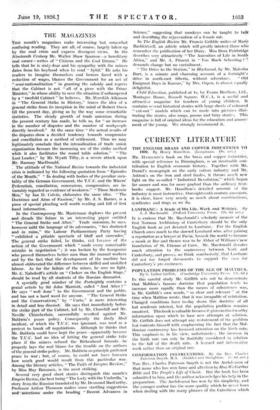POPULATION PROBLEMS OF. THE AGE OF MALTHUS. BYO. Talbot Oriffith;
(Cambridge University Poss. I 2s. aci.)
Ix this careful study Mr. Griffith sets out to demonstrate that Malthus's famous- doctrine that population tends to increase more rapidly than the means of subsistence was, in. Mr. Griffith's own words, " so clear and relevant " at the time when Malthus wrote, that it was incapable of refutation. Changed conditions have to-day shorn this doctrine of all but academic interest, but the population problem remains unsolved. This book is valuable because it gives us trustworthy inforMation upon which to base new attempts at solution. Mr. Griffith does not attempt any restatement of the problem but contents himself with emphasizing the fact that the Mal- thusian controversy has focussed attention on the birth rate. This emphasis is, in his view, unfortunate ; the increase in the birth rate can only be fruitfully considered in relation to the fall of the death rate. A learned and informative work rather than an original one.










































 Previous page
Previous page